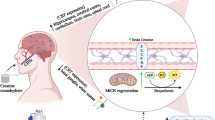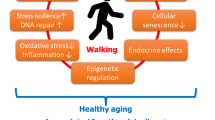Abstract
Purpose
To further inform the debate on the possible cognitive benefits of antioxidant nutrients in the elderly, we systematically reviewed available prospective studies while paying a special attention to their methodological quality.
Methods
This is a systematic review of studies involving major antioxidant nutrients and change in cognitive performance. Abstracts were independently reviewed; studies were selected based on prespecified criteria. Methodological quality of primary studies was assessed using a methodological checklist for cohort studies. Findings were presented using a narrative synthesis and tabulation of results.
Results
Eight-hundred and fifty potentially eligible studies were identified; 10 met the inclusion criteria and were retained for data extraction and appraisal. The main supportive evidence came from two studies, both judged to be of high quality: The first observed an accelerated decline in global cognition, attention, and psychomotor speed over 9 years, concomitant to a decrease in plasma selenium levels over the same period; the second study reported a slower rate of global cognitive decline over 3 years in persons in the highest quartile of intake of vitamins C, E, and carotenes. All associations persisted after adjustment for confounding factors. Evidence in favor of beneficial associations of higher dietary intake of vitamin E and flavonoids, as well as higher serum beta carotene levels, came from further studies of only adequate quality.
Conclusions
There is a possibility for protective effects of antioxidant nutrients against decline in cognition in older people although the supportive evidence is still limited in number. This association deserves further examination in additional quality investigations.

Similar content being viewed by others

References
Fried LP (2000) Epidemiology of aging. Epidemiol Rev 22:95–106
Waldstein SR, Elias MF (2003) Introduction to the special section on health and cognitive function. Health Psychol 22:555–558
Melzer D, Ely M, Brayne C (1997) Cognitive impairment in elderly people: population based estimate of the future in England, Scotland, and Wales. Brit Med J 315:462
Haan MN, Wallace R (2004) Can dementia be prevented? Brain aging in a population-based context. Annu Rev Public Health 25:1–24
Ritchie K, Lovestone S (2002) The dementias. Lancet 360:1759–1766
Seshadri S, Wolf PA (2007) Lifetime risk of stroke and dementia: current concepts, and estimates from the Framingham Study. Lancet Neurol 6:1106–1114
van der Flier WM, Scheltens P (2005) Epidemiology and risk factors of dementia. J Neurol Neurosurg Psychiatry 76:v2–v7
Alzheimer’s Disease International (2010) World Alzheimer report 2010. Alzheimer’s Disease International, London
Bruscoli M, Lovestone S (2004) Is MCI really just early dementia? A systematic review of conversion studies. Int Psychogeriatr 16:129–140
Purandare N, Ballard C, Burns A (2005) Preventing dementia. Adv Psychiatr Treat 11:176–183
Román GC (2003) Stroke, cognitive decline and vascular dementia: the silent epidemic of the 21st century. Neuroepidemiology 22:161–164
Haan MN (2003) Can vitamin supplements prevent cognitive decline and dementia in old age? Am J Clin Nutr 77:762–763
Christen Y (2000) Oxidative stress and Alzheimer diseases. Am J Clin Nutr 71:621S–629S
Langseth L (1995) Oxidants, antioxidants, and disease prevention. International Life Sciences Institute (ILSI Europe), Brussels
Singh RP, Sharad S, Kapur S (2004) Free radicals and oxidative stress in neurodegenerative diseases: relevance of dietary antioxidants. J Ind Acad Clin Med 5:218–225
Willcox BJ, Curb JD, Rodriguez BL (2008) Antioxidants in cardiovascular health and disease: key lessons from epidemiologic studies. Am J Cardiol 101:75D–86D
Morris MC, Christine TC (2011) A potential design flaw of randomized trials of vitamin supplements. J Am Med Assoc 305:1348–1349
Isaac M, Gad El Kareem N, Quinn R, Tabet N (2008) Vitamin E for Alzheimer’s disease and mild cognitive impairment. Cochrane Database Syst Rev 3. doi:10.1002/14651858.CD002854.pub2
Lee Y, Back JH, Kim J, Kim S-H, Na DL, Cheong H-K, Hong CH, Kim YG (2010) Systematic review of health behavioral risks and cognitive health in older adults. Int Psychogeriatr 22:174–187
Serra-Majem L, Roman B, Estruch R (2006) Scientific evidence of interventions using the Mediterranean diet: a systematic review. Nutr Rev 2:S27–S47
Stroup DF, Berlin JA, Morton SC, Olkin I, Williamson GD, Rennie D, Moher D, Becker BJ, Sipe TA, Thacker SB (2000) Meta-analysis of observational studies in epidemiology: a proposal for reporting. Meta-analysis of observational studies in epidemiology (MOOSE) group. J Am Med Assoc 283:2008–2012
Mayne ST (2003) Antioxidant nutrients and chronic disease: use of biomarkers of exposure and of oxidative stress status in epidemiologic research. J Nutr 133:933S–940S
Mayne ST, Wright ME, Cartmel B (2004) Assessment of antioxidant nutrient intake and status for epidemiologic research. J Nutr 134:3199S–3200S
Sahu DR, Ramakantan RR, Bavdekar SB (2000) The art and science of web-based literature search: the MEDLINE. J Postgrad Med 46:123
Kundel HL, Polansky M (2003) Measurement of observer agreement. Radiology 228:303–308
The Scottish Intercollegiate Guidelines Network (2001–2012) http://www.sign.ac.uk. Accessed 14 Dec 2011
Centre for Reviews and Dissemination (CRD) (2009) Systematic reviews: CRD’s guidance for undertaking reviews in health care. http://www.york.ac.uk/inst/crd/pdf/Systematic_Reviews.pdf. Accessed 3 Apr 2012
Morris MC, Evans DA, Tangney CC, Bienias JL, Wilson RS, Aggarwal NT, Scherr PA (2005) Relation of the tocopherol forms to incident Alzheimer disease and to cognitive change. Am J Clin Nutr 81:508–514
Hu P, Bretsky P, Crimmins EM, Guralnik JM, Reuben DB, Seeman TE (2006) Association between serum beta-carotene levels and decline of cognitive function in high-functioning older persons with and without apolipoprotein E 4 alleles: MacArthur studies of successful aging. J Gerontol (A Biol Sci Med Sci) 61A:616–620
Wengreen HJ, Munger RG, Corcoran CD, Zandi P, Hayden KM, Fotuhi M, Skoog I, Norton MC, Tschanz J, Breitner JCS, Welsh-Bohmer KA (2007) Antioxidant intake and cognitive function of elderly men and women: the Cache County study. J Nutr Health Aging 11:230–237
Kang JH, Grodstein F (2008) Plasma carotenoids and tocopherols and cognitive function: a prospective study. Neurobiol Aging 29:1394–1403
Kalmijn S, Feskens EJM, Launer LJ, Kromhout D (1997) Polyunsaturated fatty acids, antioxidants, and cognitive function in very old men. Am J Epidemiol 145:33–41
Engelhart MJ, Ruitenberg M, Meijer J, Kiliaan A, van Swieten JC, Hofman A, Witteman JCM, Breteler MMB (2005) Plasma levels of antioxidants are not associated with Alzheimer’s disease or cognitive decline. A population-based study. Dement Geriatr Cogn 19:134–139
Akbaraly NT, Hininger-Favier I, Carrière I, Arnaud J, Gourlet V, Roussel A-M, Berr C (2007) Plasma selenium over time and cognitive decline in the elderly. Epidemiology 18:52–58
Letenneur L, Proust-Lima C, Le Gouge A, Dartigues JF, Barberger-Gateau P (2007) Flavonoid intake and cognitive decline over a 10-year period. Am J Epidemiol. doi:10.1093/aje/kwm036
Maxwell CJ, Hicks MS, Hogan DB, Basran J, Ebly EM (2005) Supplemental use of antioxidant vitamins and subsequent risk of cognitive decline and dementia. Dement Geriatr Cogn 20:45–51
Velho S, Marques-Vidal P, Baptista F, Camilo ME (2008) Dietary intake adequacy and cognitive function in free-living elderly: a cross-sectional and short-term prospective study. Clin Nutr 27:77–86
Castellani RJ, Lee H, Perry G, Smith MA (2006) Antioxidant protection and neurodegenerative disease: the role of amyloid-β and tau. Am J Alzheimers Dis Other Demen 21:126–130
Anderson JK (2004) Oxidative stress in neurodegeneration: cause or consequence? Nat Rev Neurosci 5:S18–S25
O’Brien JT, Erkinjuntti T, Reisberg B, Roman G, Sawada T, Pantoni L, Bowler JV, Ballard C, DeCarli C, Gorelick PB, Rockwood K, Burns A, Gauthier S, DeKosky ST (2003) Vascular cognitive impairment. Lancet 2:89–98
Pashkow FJ (2011) Oxidative stress and inflammation in heart disease: do antioxidants have a role in treatment and/or prevention? Int J Inflamm. doi:10.4061/2011/514623
Morris MC, Evans DA, Hebert LE, Bienias JL (1999) Methodological issues in the study of cognitive decline. Am J Epidemiol 149:789–793
Bischkopf J, Busse A, Angermeyer MC (2002) Mild cognitive impairment—a review of prevalence, incidence and outcome according to current approaches. Acta Psychiatr Scand 106:403–414
Egger M, Schneider M, Smith GD (1998) Meta-analysis spurious precision? Meta-analysis of observational studies. Brit Med J 316:140–144
Lezak M (1995) Neuropsychological assessment, 3rd edn. Oxford University Press, New York
Acknowledgments
This work was supported by the CHANCES (Consortium on Health and Ageing: Network of Cohorts in Europe and the United States) project (Grant Agreement number: 242244) funded by the European Commission under the FP7 framework programme. The authors would like to thank Professor Dimitrios Trichopoulos, Harvard School of Public Health, and Dr. Roger Humphry, Epidemiology Research Unit, Scottish Agricultural College, for providing valuable comments on earlier versions of this paper. Also, we thank the referees assigned to this paper for their constructive comments and suggestions which considerably helped improve the manuscript.
Conflict of interest
The authors declare that they have no conflict of interest.
Author information
Authors and Affiliations
Corresponding author
Rights and permissions
About this article
Cite this article
Rafnsson, S.B., Dilis, V. & Trichopoulou, A. Antioxidant nutrients and age-related cognitive decline: a systematic review of population-based cohort studies. Eur J Nutr 52, 1553–1567 (2013). https://doi.org/10.1007/s00394-013-0541-7
Received:
Accepted:
Published:
Issue Date:
DOI: https://doi.org/10.1007/s00394-013-0541-7



